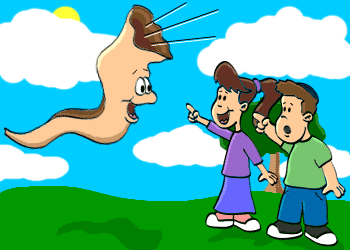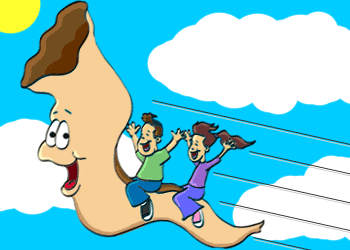 Identifying as a Jew
Identifying as a Jew


5 min read
Tooooooooo! Toooooooo! Tooooooooooo!
"Hey Danny," asked Dina, "what was that noise?"
"I don't know Dina, but look over there, that thing is coming our way," said Danny.
A horn that was in the shape of a half circle flew through the air right up to Danny and Dina. It was narrow on one end and wide on the other.

"Hi everybody! I am a shofar and my name is Shrilly. Really! Shrilly, the Shofar."
"Uh, Danny, that shofar is talking to us," said Dina.
"Yeah, I see. I mean I hear ... I mean ... Hey, uh, Mr. Shofar, did you say your name is Shrilly? Don't be silly! Shofars don't have names and shofars don't talk!"
"Well, now they do," said Shrilly. "In case you haven't guessed what I do, well, I shrill. Let me be your guide if you will and take you for a thrill. I will guide you through the Jewish month of Elul and then we will learn about the month of Tishrei featuring Rosh Hashana and Yom Kippur! Do you know how many shrills Shrilly will shrill and still not get ill? I never need a pill! My sound carries far, even up a big hill! So are you ready to trill?"
"You mean you're going to take us for a ride?" asked Dina. "Wow!"
The two children got on Shrilly the Shofar's back and off they went. As they flew away, Shrilly let out a big shrill: "Tooooooooo! Toooooooo! Tooooooooooo!!"

They came to the month of Elul, the last month of the Jewish year. This is where their tour began.
"Wait a second," said Dina. "Why are we starting from the end, at the last month?"
"Good question," said Shrilly. "In the beginning, when God created the world, there weren't any calendars around, but tradition teaches us that the first day of creation was six days before Rosh Hashana. That means the world was created in the month of Elul! So let's start at the very beginning!"
"That's a very good place to start!" said Danny.

The month of Elul is the last month of the year in the Jewish calendar. Do you know the names of the 12 months? Let's try to say them together:
Tishrei, Cheshvan, Kislev, Tevet, Shvat, Adar, Nissan, Iyar, Sivan, Tammuz, Av and Elul. As soon as Elul ends, Rosh Hashana, the Jewish New Year begins. Since Rosh Hashana is also a Day of Judgment, during the month of Elul we review and examine our actions from the past year. We strive to increase our good deeds so God will grant us a good New Year.
![]()

Now for a little history. It was during this month, the month of Elul, that Moses climbed up Mount Sinai to receive the two stone tablets that contained the Ten Commandments. These tablets replaced the first set which broke at the scene of the Golden Calf (oh what an interesting story, but we'll have to save that for another time). Anyway, Moses went up the mountain for 40 days and 40 nights, from the 1st day of Elul until Yom Kippur, the 10th day of Tishrei. He didn't even have any food or drink with him! Moses was a very special man, the leader of the Jewish People. God even made miracles for him.
![]()

The month before Rosh Hashana is a time to make personal accountings in our hearts about the past year’s actions. In case you forget, you have a very convenient reminder. Me, Shrilly the Shofar! Every day during Elul (except for Shabbat) I do a triple shrill in the synagogue after the morning service. My sound stirs up emotions by going straight to people's hearts like a siren. It's a reminder to think about the wrong things we may have done over the last year. If we did anything wrong, it is proper to regret it and try hard not to do let it happen again. In Hebrew this is called teshuva.
![]()

Elul is the time for friends to make up if there were any feelings hurt throughout the year. If you are involved in an argument that hasn't yet been settled, or made someone feel bad verbally, this is the time to ask for forgiveness. If anyone approaches you for forgiveness for some wrong they may have caused you, it is a good thing to forgive him or her without thinking about it too much. It's not so hard, and you'll sure feel good afterwards. (Fringe benefit: If we forgive our friends for things they did, even if they were wrong, God forgives us for things we may have done, even if we were wrong.)
![]()

Even though Rosh Hashana hasn't arrived, it is customary to wish friends and relatives a Shana Tova, or "A Good Year." Some people send greetings cards to one another. (Grandparents, relatives, friends) I especially like this part of Elul, because my picture is put on so many different cards. ("Shrilly the Shofar, wishes you a blast - Toooooooo") Some of the different greetings that people write are: "May You Have a Healthy Year!" "May You Be Inscribed in the Book of Life!" (One of my favorites has a jar of honey on it and reads: "Honey! Have a Sweet Year!") A great activity is to make home-made cards and then send them out in the mail. It's loads of fun that can involve cutting, coloring, gluing, writing and mailing.
